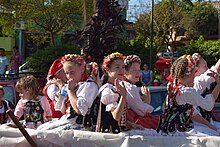Ethnic group
| Polscy Argentyńczycy (Polish) Polaco-argentinos (Spanish) | |
|---|---|
 Polish Argentines in the inaugural parade of the Immigrant's Festival Polish Argentines in the inaugural parade of the Immigrant's Festival | |
| Total population | |
| Unknown (by birth) 2,000,000 (by ancestry) | |
| Regions with significant populations | |
| Predominantly in the Pampas, Misiones, Chaco and Córdoba | |
| Languages | |
| Spanish · Polish | |
| Religion | |
| Majority: Catholicism Minority: Judaism · Irreligion | |
| Related ethnic groups | |
| Poles · Ashkenazim · Polish Brazilian · Polish American · Polish Canadians |
Polish Argentines (Spanish: polaco-argentinos; Polish: polscy argentyńczycy) are Argentine citizens of full or partial Polish ancestry or Poland-born people who reside in Argentina. Poland was the fourth largest net migrants contributor after Italy, Spain and Germany. Although it is hard to give an exact number of Polish immigrants to Argentina, as those who immigrated before 1919 carried German, Austrian or Russian passports, it is estimated that between 1921 and 1976, 169,335 Poles permanently settled in the country. Today there are 2 million Argentines of Polish descent. The Polish minority in Argentina is both one of the most significant minorities in Argentina and one of the largest groups of Polish diaspora.
Polish immigration to Argentina

It is not easy to determine the number of Poles who immigrated to Argentina. Before 1919, they were registered as Germans, Austrians, or Russians. Polish immigrants to Argentina were made up of three distinct groups: the Catholic ethnic Poles (25%), the Orthodox and Eastern Catholic Ruthenians (45-50%) and the Polish Jews (25-30%). Between 1921 and 1976, 169,335 immigrants from Poland permanently settled in Argentina.
The first Poles arrived in Argentina during the 19th century. In 1890, the first Polish organization in Argentina was founded (Towarzystwo Polskie). For many years, the Misiones Province was the major Polish center in Argentina.
Today it is estimated that between 2 million Argentines have Polish ancestry. Over a quarter of Misiones population has Polish roots (250,000 persons), the highest concentration of Polish Argentines in the country. About 140,000 Poles live in Buenos Aires; other Argentine cities with large Polish populations include Córdoba, Rosario and Santa Fe.
A major organization of the Polish minority is the Polish Association in Argentina (Związek Polaków w Argentynie).
In 1995 the Argentine National Congress made June 8 Polish Settlers' Day.
Notable people

- Carlos Bielicki, chess master
- Fabián Bielinsky (1959-2006), movie director
- John Bocwinski, football player
- Juan Pablo Brzezicki, ex tennis player
- Vladislao Cap (1934-1982), ex football player and manager
- Gisela Dulko, tennis player
- Paulo Dybala, football player
- Cristian Dzwonik aka "Nik", cartoonist
- Juan Foyth, football player
- Francisco Fydriszewski, football player
- Witold Gombrowicz (1904-1969), writer
- Guido Kaczka, TV presenter, radio host
- Enzo Kalinski, football player
- Diego Klimowicz, football player
- Bautista Kociubinski, football player
- Mariano Kowalczuk, influencer ("Viajero poco frecuente")
- Frank Darío Kudelka, football coach
- Miguel Najdorf (1910-1997), chess master
- Marzenka Novak, actress
- Mario Pasik, actor
- Chango Spasiuk, musician
- Ayelén Stepnik, field hockey player
- Fernando Troyansky, football player
- Rubén Wolkowyski, basketball player
- Ricardo Zielinski, ex football player and presently coach
Figures
| Polish net migration to Argentina from 1921 to 1976<ref name="Clarin.com2004"> | ||||
|---|---|---|---|---|
| Year period | Polish immigrants | |||
| 1921-1930 | 119,410 | |||
| 1931-1940 | 31,500 | |||
| 1941-1950 | 16,784 | |||
| 1951-1960 | 325 | |||
| 1961-1970 | 1,845 | |||
| 1971-1976 | -529 | |||
| Total | 169,335 | |||
See also
- Argentina–Poland relations
- Polish diaspora
- Argentines of European descent
- Zwi Migdal
- Florian Czarnyszewicz
- Witold Gombrowicz
References
- ^ "Polaca | Buenos Aires Ciudad - Gobierno de la Ciudad Autónoma de Buenos Aires". Archived from the original on July 4, 2016. Retrieved August 3, 2016.
- ^ "Migration and nationality patterns in Argentina" (PDF). Sscnet.ucla.edu. p1 APPENDIX Table 1b. "Polish". Archived from the original (PDF) on June 8, 2011. Retrieved January 14, 2018.
- ^ "La ampliación de la Unión Europea habilita a 600 mil argentinos para ser comunitarios". Clarin.com. April 27, 2004. Archived from the original on March 12, 2016. Retrieved January 14, 2018.
- ^ "Polonia es la nueva puerta de entrada de argentinos a Europa". Clarin.com. May 3, 2004. Archived from the original on September 22, 2007. Retrieved January 14, 2018.
Tampoco hay certeza de cuántos argentinos-polacos hay. La cifra más alta es de Alberto Sarramone en su libro Los abuelos inmigrantes: un millón. El embajador Ratajiski calcula la mitad
- "Strona główna - Gazeta Uniwersytecka". Gu.us.edu.pl. Retrieved January 14, 2018.
- "MisionesOnline". Misionesonline.net. Archived from the original on July 19, 2011. Retrieved January 14, 2018.
Se mostró sorprendido por la cantidad de polacos que aquí viven en Misiones, estimando en 250 mil los descendientes del país europeo
- ""Stowarzyszenie Wspólnota Polska"". Wspolnota-polska.org.pl. Retrieved January 14, 2018.
- "Polish Argentines". Wspolnota-polska.org.pl (in Polish). Retrieved January 14, 2018.
External links
- The Other Child: Poles in Latin America
- (in Spanish) elaguilablanca
- (in Polish) Kultura polska w Argentynie
- (in Polish) SZLAKIEM WYCHODŹCÓW
| Argentines of European descent | |
|---|---|
| Central | |
| Eastern | |
| Northern |
|
| Southeast | |
| Southern |
|
| Western | |
| All | |
| Ancestry and ethnicity in Argentina | |||||||||||||||||||
|---|---|---|---|---|---|---|---|---|---|---|---|---|---|---|---|---|---|---|---|
| Ancestral background of Argentine citizens | |||||||||||||||||||
| Africa | |||||||||||||||||||
| Americas |
| ||||||||||||||||||
| Asia | |||||||||||||||||||
| Europe |
| ||||||||||||||||||
| Polish diaspora and Polish minorities | |||||||||||||||||||
|---|---|---|---|---|---|---|---|---|---|---|---|---|---|---|---|---|---|---|---|
| Historical | |||||||||||||||||||
| Diaspora |
| ||||||||||||||||||
| See also | |||||||||||||||||||